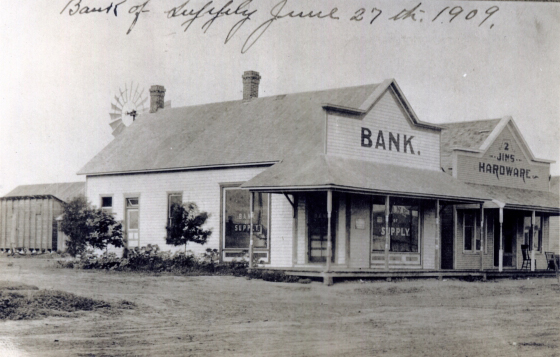The Encyclopedia of Oklahoma History and Culture
FORT SUPPLY.
The town of Fort Supply is located in the northwestern corner of Woodward County, thirteen miles northwest of the county seat of Woodward. The first post office was established on May 12, 1903. On May 1, 1943, the name of the post office and town was changed to Fort Supply. Founder James P. Gandy, a territorial legislator, originally named the town Supply after the frontier military post (1868–94) located one mile east of the townsite. Rancher H. H. Halsell sold the land to Gandy, who had it platted for a townsite in 1903. Most of the original buildings of Supply were moved from the failed town site of Fitzgerald, which had been established two miles southwest in 1902.
In the early years Supply was the economic center for area farmers and ranchers. In 1908 the old army post east of the town became Western Oklahoma Hospital, Oklahoma's first state-operated mental institution. The Flood Control Act of 1936 provided that a dam and reservoir be constructed one mile southeast of the town in the valley of Wolf Creek. Work began in October 1938 and was completed in May 1942. At that time it was the largest earthen dam in the United States. Fort Supply Lake and the adjacent wildlife and recreation area are administered by the U.S. Army Corps of Engineers.
Fort Supply's population at 1907 statehood numbered 783; it had declined to 230 by 1930. The number of inhabitants fluctuated from 414 in 1940 to 293 in 1950 to 394 in 1960. By 1980 the number had rebounded to 559 and in the year 2000 stood at 328. At the end of the twentieth century, the community's economic base remained grounded in agriculture and employment at the Western State Psychiatric Center and William S. Key Correctional Center, located on the grounds of nearby historic Fort Supply. The 2010 census counted 330 residents there. In April 2020 the census reported 320.
Learn More
Robert Barron, "Building Fort Supply Dam was Economic Boost in the '30s," Woodward (Oklahoma) News, 18 June 1989.
Louise B. James, Below Devil's Gap: The Story of Woodward County (Perkins, Okla.: Evans Publications, 1984).
C. L. Packer, "Mr. Fort Supply," Tulsa (Oklahoma) World, 28 May 1967.
George H. Shirk, Oklahoma Place Names (2d ed.; Norman, University of Oklahoma Press, 1974).
Related Resources
Citation
The following (as per The Chicago Manual of Style, 17th edition) is the preferred citation for articles:
Bob Rea, “Fort Supply (town),” The Encyclopedia of Oklahoma History and Culture, https://www.okhistory.org/publications/enc/entry?entry=FO043.
Published January 15, 2010
Last updated March 1, 2024
© Oklahoma Historical Society


